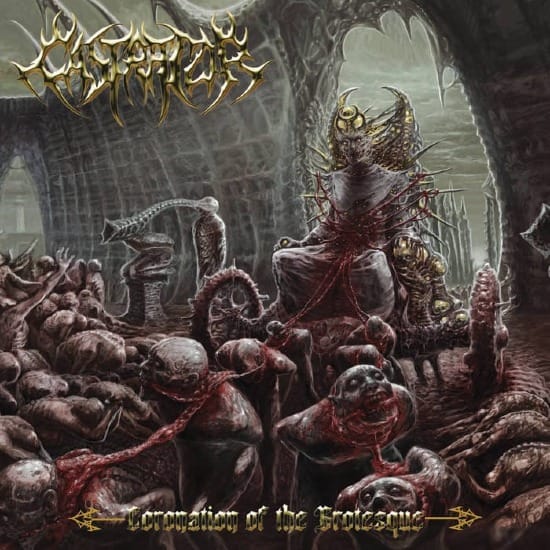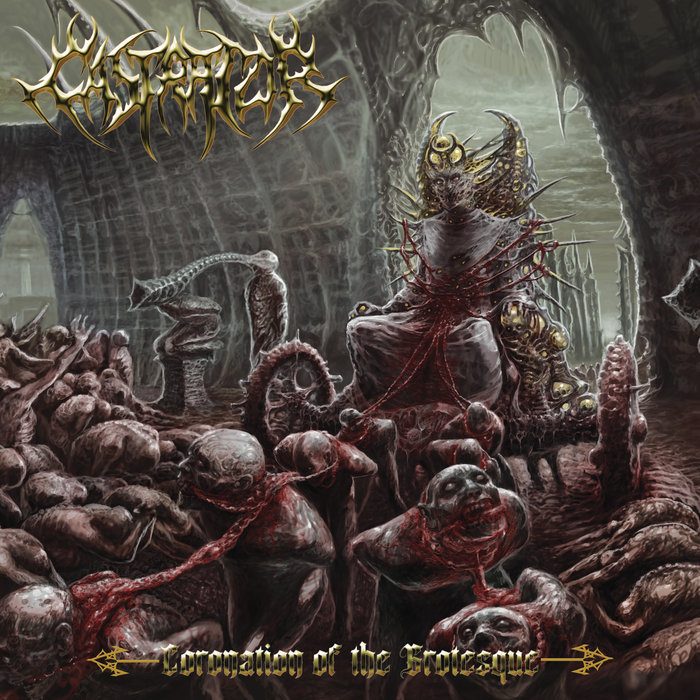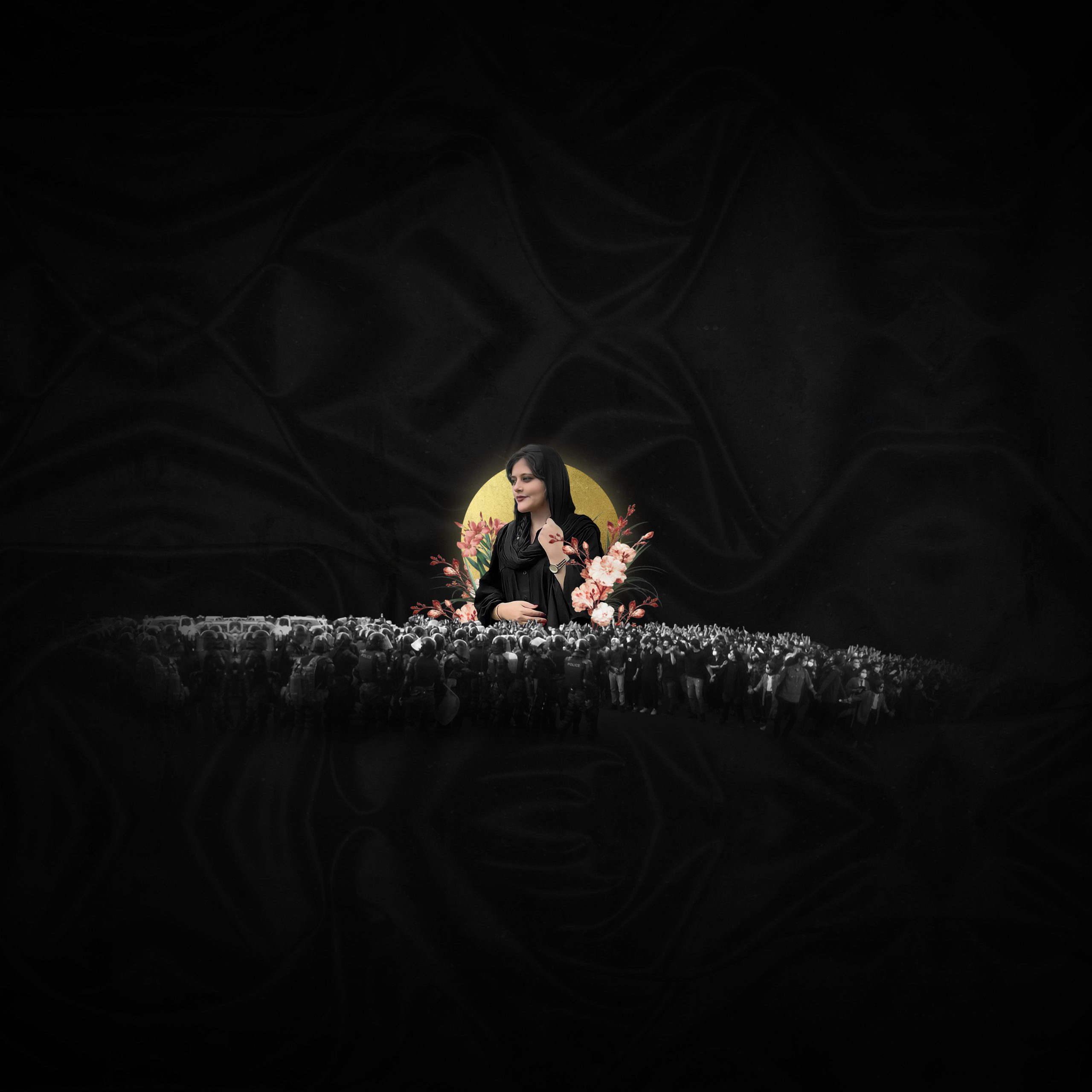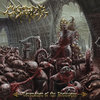Castrator Sharpen Their Knives
The brutal feminist death metallers return with a killer new guitarist, a blood-splattered new album, and plenty of new bones to pick.

Conventional wisdom holds that revenge is a dish best served cold, but Castrator prefer it hot, bloody, and pointed. The feminist death metal collective have been serving up brutal eviscerations of misogyny, patriarchy, rape culture, and religious authoritarianism since their formation in 2013 as a multinational project with members hailing from Mexico, Norway, Sweden, Colombia, and the U.S. The band's 2015 debut EP, No Victim, was a well-placed shot across the bow that saw a lethal lineup of extreme metal veterans viciously claw back power from the hands of the lurking abusers and slithering oppressors who haunt every woman's world.
Take a listen to "The Emasculator,' and try not to let an evil smile flicker across your lips. We've been told for decades that all the sloppy, slobbering violence against women that's so lovingly described in countless death metal songs is "just fantasy"—well, fellas, us girls can dream, too.
"We are turning the tables on what you usually see in brutal death metal that focuses on rape and torture of women," former Castrator vocalist Mallika Sundaramurthy told me back in 2015, shortly after the band released their landmark No Victim EP. "We are doing what the guys do but from a female point of view, and in doing so making a critique of the whole genre. In some of our themes, a woman is the powerful one, the victor. If someone has a problem with our lyrics and samples, they should frown equally upon misogynistic themes."
Since then, the lineup has shifted a few times, but band co-founders Robin Mazen and Carolina Pérez Arango are still laser-focused on their original goal: churning out gut-wrenching brutal death metal tunes that whip ass and also explicitly confront the genre's long festering habit of celebrating gendered violence towards one specific gender. Yes, not all brutal death metal bands are made up of woman-hating meatheads who gleefully gurgle songs about defiling ladies' corpses, and in recent years there has been pushback against the worst of them from within the scene.
Still, far too many brutal death metal outfits indulge in the same old played-out, gratuitous lyrical misogyny, enough that it's unfortunately come to define the genre. (Trust me, I had a huge goregrind phase in high school, and there's some truly rancid shit out there). It's boring, and unoriginal, and there's nothing transgressive about spouting the same kind of sniveling rape fantasies that the literal President of the United States gets away with mumbling about on the daily.

Thankfully, the clods have got competition. After leaving Castrator, Sundaramurthy launched a feminist brutal death metal project of her own, Emasculator, and Castrator's current members are all deeply embedded in the death metal scene. Alongside their shared commitment to this band, bassist Mazen stays busy hauling double duty in iconic Pittsburghers Derkéta (one of the first USDM bands to have an all-women lineup) and gory supergroup Gruesome, while drummer Arango holds it down in NYC bruisers Hypoxia, vocalist Clarissa Badini thrashes it up in Vicious Blade, and brand-new guitarist Sara Loerlien experiments with extremity in The Breathing Process. They're lifers, in the best way possible, and their dedication and virtuosic knowledge of and love for death metal bleeds through in every riff and every lyric.
I try not to fall into the mid-2000s trap of overemphasizing musicians' gender (talk about boring and reductive) but as a former death metal-obsessed girl turned death metal-obsessed woman, permit me to say that I am so, so happy that a band like this exists. If Castrator had been around when I was 16 and just starting to go to metal shows, I bet I would've put up with a lot less shit from creepy dudes—and maybe even found my fellow sisters in gore earlier. Thankfully, they're here for us now, and are gearing up for their busiest year yet.
Drummer and band co-founder Carolina Pérez Arango was kind enough to answer a few questions for me ahead of the release of the band's crushing new album, Coronation of the Grotesque (which is now available for streaming, purchase, and general worship from the band and their label, Dark Descent!). This interview has been lightly edited for clarity and to tone down my goofy fangirl vibes.

SALVO: Coronation of the Grotesque marks Castrator's second full-length, and your first with shredder Sara Loerlein. How did you all link up?
CAROLINA PÉREZ ARANGO: Yes, we're incredibly proud of this album. We had been following Sara’s work for a while, she's a total shredder and a serious talent. She also happens to be close friends with Clarissa, so when the opportunity arose to bring on a full-time guitarist, she was naturally at the top of our list. She was interested, and it just clicked. It was a no-brainer to welcome her into the band.
I may be wrong, but it seems like you're almost all based in the Pittsburgh area now after years of being separated by geography (including international borders!). How has the new setup impacted the band's dynamic, and guided the writing and recording process for this new record?
I relocated to the Cleveland area during the pandemic, which is only about two and a half hours from Pittsburgh. So even though we're technically in different cities, the distance is minimal. Everything came together organically, and being closer geographically definitely helped with collaborating on the album.

You brought in some DM heavy hitters to handle the technical aspects of the album, too—tell me a little about that part of the process. What felt different this time around? How has your songwriting evolved since Defiled in Oblivion?
This time around, we worked with Taylor Nordberg from Deicide as our producer, which brought a new level of technical expertise to the process. Robin and I (Carolina) wrote all of the material, and Coronation of the Grotesque really reflects our evolution as a band and our deeper bond through death metal. We also brought in some guest soloists, those “DM heavy hitters”—because we love incorporating different styles and flavors, and paying homage to artists we admire.
The album begins with "Fragments of Defiance," a furious tribute to Kurdish-Iranian martyr Mahsa Amini, who died after being attacked by Iranian religious authorities. Her murder—and that strand of defiance—helped inspire the Women, Life, Freedom movement. You have a tradition in this band of writing songs about brave, bold women in inhospitable environments. What drew you to her story, and what point do you want to hammer home with this song?
As a band made up of women, we naturally write from our own perspectives and experiences, often addressing real-world issues that affect us deeply. Mahsa Amini’s murder was absolutely enraging, and we felt compelled to bring attention to her story. Through this song, we wanted to shine a light on the oppressive systems that led to her death and encourage others to push back against archaic, anti-women doctrines.

This isn't the only time on the album you decry the abuses of organized religion, either; it's been part of the band's foundation since the very beginning, and emerges as a major lyrical theme here. Can you expound on the roots of your critiques of organized religion? (I was raised Catholic, so I'm right there with you). What draws you to write about the horrors of religious fundamentalism in its many ugly forms?
Absolutely, we all come from diverse cultural and religious backgrounds, but one thing that unites us is our rejection of authoritarian religious structures. These systems have caused unimaginable harm across history, especially toward women, and we’ve all seen different versions of that. Writing about it is both cathartic and a way to challenge those oppressive ideologies.
"I Am Eunuch" is another fascinating song, first because it's a little bit of a historical deep cut (eunuchs aren't quite so well-known as they were a few thousand years ago) and secondly because of how it subverts assumptions around gender—ritual castration being done to men, by men, to serve male rulers and courts, stands out amidst the global history history of men inflicting violence on everyone else. What made you want to tackle this subject? It's not Castrator's first nod to, well, castration, but the historical angle is pretty specific!
We’re always fascinated by history and how it reveals the darker sides of human nature, perfect material for death metal. “I Am Eunuch” explores a historical form of gender violence that’s less discussed but deeply symbolic. We took a similar approach on our first album with “Voices of Evirato,” which addressed the castrati. Coronation of the Grotesque also includes “Saint Bartholomew,” which recounts his gruesome flaying. These stories allow us to reflect on violence, power, and how those themes continue to echo today.
I love that you also included a straightforward ode to heavy metal hell, and close out the album with "Metal Command" (you've even got Exodus legend Gary Holt on there!). I know you're all lifelong metal maniacs, and it's fun to see you express that alongside these more cerebral, grim concepts. Tell me about this song! What made you want to end the album on this note?
We’ve always been about paying homage to old-school death metal, and “Metal Command” is one of our absolute favorites on the record. We love how OSDM albums used to end with a ripper, something that felt like a final battle cry, and we wanted to bring that vibe back. And having Gary Holt on the track? That was a huge honor. It was the perfect way to close the album.
The album just dropped via Dark Descent. I know touring must be complicated given your busy schedules, but please tell me you've got some shows coming up—and maybe a Philly date?
Yes! We’re working on tour dates right now, and we definitely want to hit as many cities as we can, including Philly. It’s not always easy to coordinate with our schedules, but we’re committed to bringing this album to the stage. Keep an eye out! We’ll be announcing shows soon.
What else should we know about Castrator's plans for 2025?
We’re planning more live shows, possibly hitting some festivals, and continuing to write new material. We’re also exploring some exciting collaborations and concepts for future releases. 2025 is shaping up to be a big year for Castrator, stay tuned!
+
Stream and purchase Castrator's new album here, and subscribe to Salvo for more feminist extreme metal journalism!



